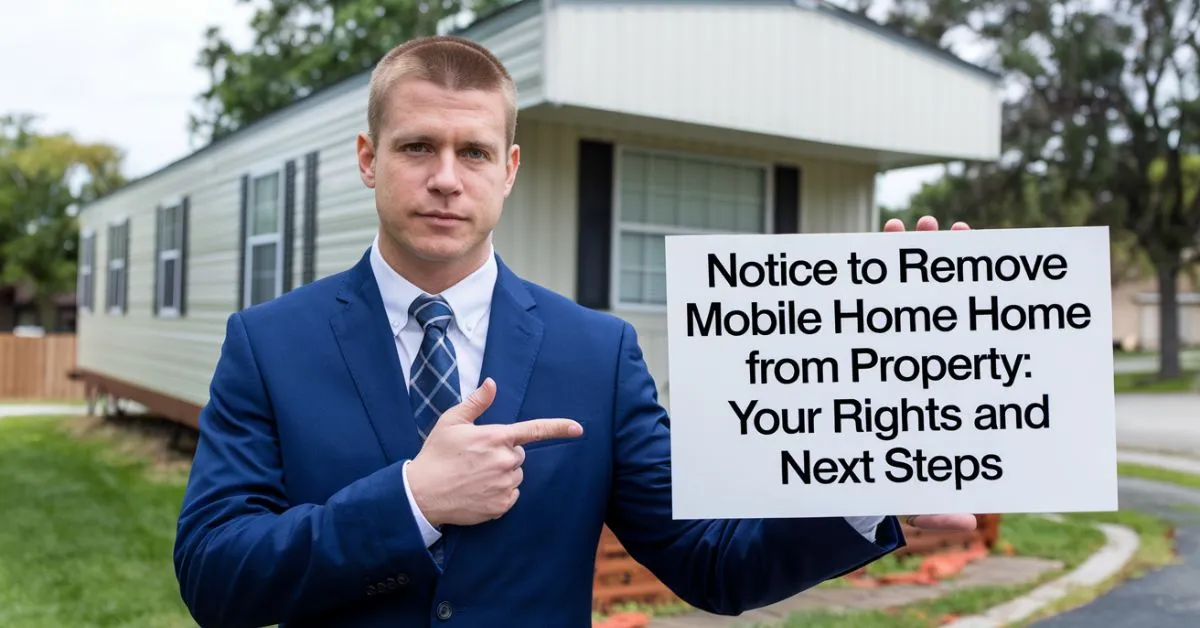Receiving a notice to remove your mobile home can be confusing. This notice usually means you need to move your home. It may happen due to lease violations or zoning issues. Read the notice carefully and note any deadlines.
You have rights even after getting the notice. Check your lease or property rules. You might have time to appeal or fix the issue. If unsure, talk to a lawyer to understand your options.
Your next steps depend on your decision. If moving, plan for costs and permits. If appealing, gather documents that support your case. Act fast to protect your rights.
What is a mobile home?
A mobile home is a type of house that is built in a factory and then moved to a specific location. Unlike traditional houses, mobile homes are not built on a permanent foundation. They are designed to be transported on wheels that are attached to the bottom of the home.

Mobile homes come in different sizes and styles. They can be single-wide, that’s narrower, or double-wide, which is about as extensive as a small traditional house. People often place those houses in mobile home parks.
But they can also be put on private land. Despite their name, maximum mobile homes stay in one region once they’re set up.
Understanding the Notice to Remove a Mobile Home from Property
When you receive a Notice to Remove a Mobile Home from Property, it means you must relocate your mobile home. This notice explains the reasons why and the timeline within which you must move. If you fail to comply, legal actions may be taken against you.
The notice typically outlines the specific violations or reasons for removal, such as zoning violations or lease agreements. It also provides instructions on how to proceed with the relocation process. Following the instructions in the notice is important to avoid further complications or penalties.
If you receive this notice, it’s crucial to act promptly and seek legal advice if needed. Ignoring the notice can lead to fines or even the forced removal of your mobile home.
Legal Considerations
These are crucial when dealing with a notice to remove a mobile home.
- Lease Agreement: The lease agreement outlines the terms and conditions for renting a property. Both the landlord and tenant must adhere to these terms.
- Zoning Regulations: Zoning regulations dictate how land can be used. They are enforced by local government authorities. Violating zoning regulations can result in fines or legal action.
- Communication: Communication involves exchanging information through speaking and writing. Effective communication is key to resolving conflicts peacefully.
The legal Consideration may be useful to explain the whole situation in Good way to protect your rights.
- Documentation: Documentation during a mobile home transaction includes paperwork like contracts, titles, and permits. It ensures legal compliance and clarity in ownership and responsibilities.
- Legal Assistance: Legal assistance provides help from lawyers or legal experts. They can give advice, represent you in court to understand your rights and responsibilities.
- Timely Action: Timely action means completing tasks promptly and within the required timeframe. It helps to prevent delays and to do things efficiently.
Related Blog: Can I Get a US Green Card to Do Real Estate? The ultimate Guide
Collaborating with Professionals
When moving a mobile home, it’s important to work with experienced professionals. These experts understand the complexities of transporting large structures safely. They can help you navigate regulations and ensure your home arrives undamaged.
Professional movers will handle tasks like disconnecting utilities, securing loose items, and preparing the home for transport. They also obtain necessary permits and plan the best route. Working closely with these professionals can make the moving process smoother and less stressful.
After the move, professionals can help set up your home at its new location. This includes leveling the home, reconnecting utilities, and making sure everything is working properly. Clear communication with your moving team throughout the process is key to a successful relocation.
Assessing Costs and Budgeting

Assessing costs and budgeting for a mobile home involves estimating expenses for purchase and potential renovations. It’s important to consider ongoing expenses like lot rent to ensure financial stability. Creating a detailed budget helps manage expenses. It ensures that you can comfortably afford your mobile home.
Assessing Costs
Assessing costs means budgeting for potential renovations. It ensures the mobile home to meet your needs and preferences. It’s essential to consider ongoing expenses like lot rent and utilities to maintain your budget effectively.
Assessing costs involves calculating the price of the mobile home. Its price varies depending on its condition and location. It also includes estimating relocation expenses, such as transportation and setup fees, which can add up quickly.
Budgeting Costs
In the USA, a single-wide mobile home costs $50,000 to $80,000. Double-wide homes range from $100,000 to $150,000. Land rent is $300 to $700 per month. Utilities can add $100 to $300 monthly.
In Mexico, mobile homes cost $30,000 to $60,000. Land rent is cheaper, around $100 to $300 monthly. Utilities cost $50 to $150 per month. Transport and setup can add $2,000 to $5,000.
Environmental Considerations
The environment considerations means being mindful of how your actions impact nature. You can help by using eco-friendly materials and reducing waste during renovations. Planting trees and creating green spaces around your mobile home can also benefit the environment.
Conserving energy by using energy-efficient appliances and lighting can lower your carbon footprint. Recycling and properly disposing of waste materials help keep the environment clean and healthy. By taking these simple steps, you can contribute to a more sustainable future for our planet.
Also Read This Post: CHURCHES THAT HELP WITH RENT ASSISTANCE NEAR ME: A STEP BY STEP GUIDE
Communicating Effectively
Communicating effectively is essential in all aspects of life. It involves expressing yourself clearly and listening attentively to others. Effective communication helps you convey your ideas, understand different perspectives, and collaborate successfully with others.
Communicating effectively involves:
- Clarity and Conciseness: Use clear and concise language to convey your message.
- Active Listening: Listen attentively to understand the other person’s perspective.
- Body Language: Use open and welcoming body language to show interest.
- Feedback: Provide constructive feedback to improve understanding.
- Respect: Show respect for others’ opinions and viewpoints.
Effective communication builds strong relationships and fosters understanding in all interactions.
What If the owner Is Unknown or Elusive?

If the owner of a mobile home is unknown or elusive, it can make complex legal matters. You may need to conduct a thorough search to locate the owner. This process could involve checking property records and contacting previous owners.
If you can’t find the owner, you might need to seek legal advice to determine the best course of action. Legal procedures may allow you to take possession of the mobile home. It’s important to follow legal guidelines and document all attempts to contact the owner.
Also Read This Post: WHAT DOES THE TERM COE MEAN IN REAL ESTATE AND WHY DOES IT MATTER?
Frequently Asked Questions
How do I remove a mobile home?
You can remove it by hiring a professional moving company specializing in mobile homes.
How do I evict a mobile home from my land in Florida?
To evict a mobile home from your land in Florida, you typically need to follow the legal eviction process.
What is a Notice to Remove Mobile Home from Property?
It’s a legal document requiring you to relocate your mobile home from the property by a specified date.
What should I do if I receive a Notice to Remove Mobile Home from Property?
Contact local authorities to understand the reason for the notice and discuss your options.
What are my rights and responsibilities when I receive a Notice to Remove Mobile Home from Property?
You have the right to challenge the notice if you believe it’s unjustified. You must comply with the relocation deadline to avoid legal consequences.
Final Thoughts
Understanding your rights and responsibilities regarding a Notice to Remove Mobile Home from Property is very important. This legal document requires you to relocate your mobile home through a specified date. If you receive this notice, contact local authorities promptly to understand the reasons behind it. You have the right to challenge the notice if you believe it’s unjustified.
Failure to comply with the relocation deadline can lead to legal consequences. It’s important to act quickly and seek legal advice if needed to protect your rights. Take actions to avoid any issues.

Paul Mitchell, our website’s author, leverages 6 years of business expertise to provide insightful content. His wealth of experience enriches our platform, offering valuable insights for our readers.











